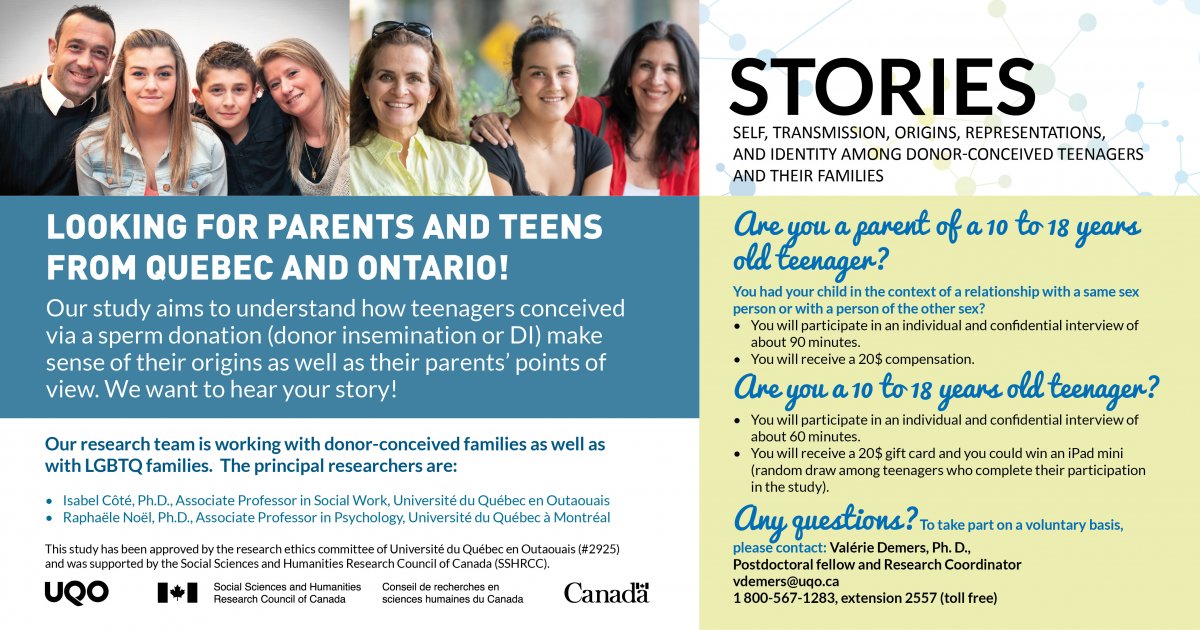Main Objectives
- Develop a better knowledge of how donor-conceived teenagers (donor insemination or DI in a fertility clinic) understand and make sense of their biological origins
- Understand the circumstances in which these teenagers learned they are donor-conceived
- Discover how these teenagers and their parents picture the donor
Who can participate?
- 10 to 18 years old donor-conceived teenagers
- Theirs parents, who had them in the context of a relationship with a same-sex person or with a person of the other sex
- Participants must come from Quebec or Ontario
- Participants must be able to talk in English or in French
What will I have to do?
Teenagers
You will take part in an individual and confidential 60 minutes interview, which will be audio recorded. Our research team will discuss with you regarding your family and regarding how you experience being donor-conceived. You will be asked to fill out a questionnaire developed to understand how teenagers understand the fact of being donor-conceived. *What you’ll tell us will not be shared with your parents!
Parents
Each parent will take part in an individual and confidential 90 minutes interview. This interview will be audio recorded. During the interview, we will explore themes such as your decision to conceive a child via a donation and the circumstances in which you have explained to your child that he or she was donor-conceived. You will also be asked to fill out questionnaires developed for couples having children with the help of assisted procreation and exploring the emotions that can arise in this context. *What you’ll tell us will remain confidential and will not be shared with your child or your spouse/partner.
As soon as the interviews are transcribed, the audio recording will be destroyed. The transcripts will be anonymized; thus, each participant will be identified by an alphanumeric code (e.g., P1-M).
This research project was supported by the Social Sciences and Humanities Research Council of Canada (SSHRCC). It also has been approved by the research ethics committee of Université du Québec en Outaouais (#2925).
Any Questions? / To take part on a voluntary basis
Valérie Demers, Postdoctoral Fellow and Research Coordinator
- vdemers@uqo.ca
- 1 800 567-1283, extension 2557 (toll free)
Main Researchers
Isabel Côté
Associate Professor in Social Work at Université du Québec en Outaouais (UQO), Isabel is particularly interested in the experience of starting a family with the help of a third party (gamete donors or women conceiving children for other women), as well as how the children conceived this way understand being donor-conceived.
Raphaële Noël
Principal co-researcher in this project, Raphaële is a clinical psychologist working with children, teenagers, and their parents. After working for 15 years in child psychiatry, she now teaches as Associate Professor at Université du Québec à Montréal (UQAM). Among other subjects, she is interested in the evaluation process involved in child clinical psychology. She is also interested in parenthood high-intensity situations, including the transition to parenthood with the help of assisted procreation, as well as procreation third parties (e.g., ovocyte donors) and donor-conceived children.
Kévin Lavoie
Having studied Social Work, Kévin is presently a Postdoctoral Fellow in Nursing Studies at UQO. In his teaching and research, he is interested about sexual and gender diversity, social intervention with LGBTQ+ individuals and assisted procreation practices (gamete donation, surrogate motherhood). He is a coresearcher for the project STORIES.
Valérie Demers
After finishing her doctoral studies in Psychology, Valérie is now collaborating to the project STORIES as a Postdoctoral Fellow. Her research concerns, among others, gender and sexual diversity. Her thesis aimed to understand the social (e.g., norms) and individual factors influencing how nonheterosexual and heterosexual conceive of themselves as romantic partners.
Other Researchers involved in this project
- Katherine Péloquin, Associate Professor in Psychology at UQAM
- Christine Gervais, Professor in Nursing Studies at UQO
- Diane Dubeau, Full Professor in the Psychology and Psychoeducation Department of UQO
- Francine de Montigny, Full Professor in Nursing Studies at UQO and holder of the Canadian Research Chair in Family Psychosocial Health





